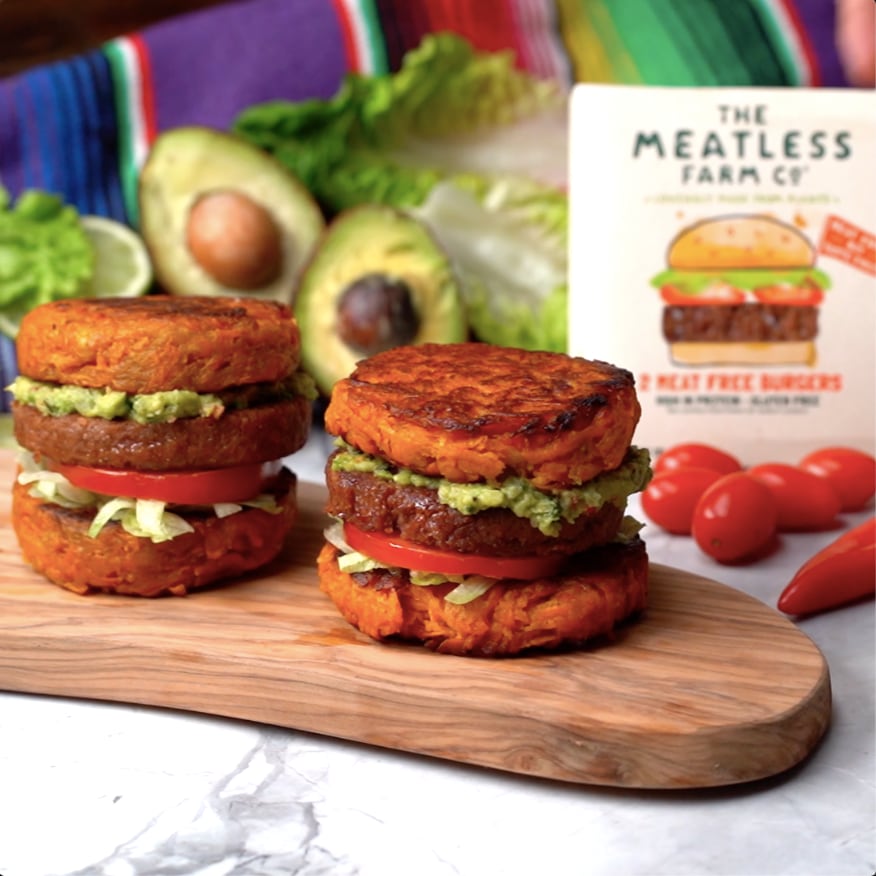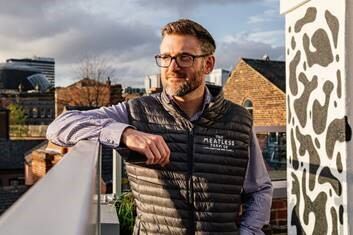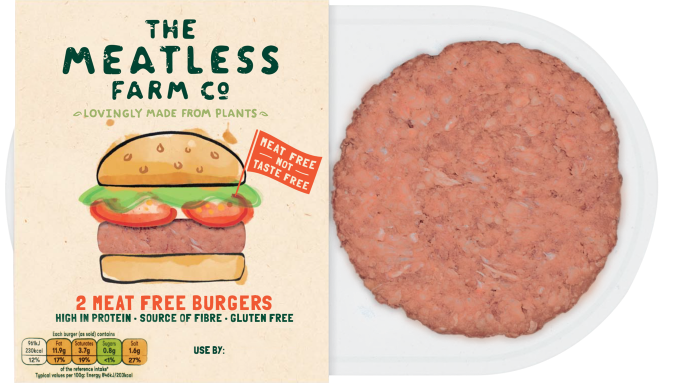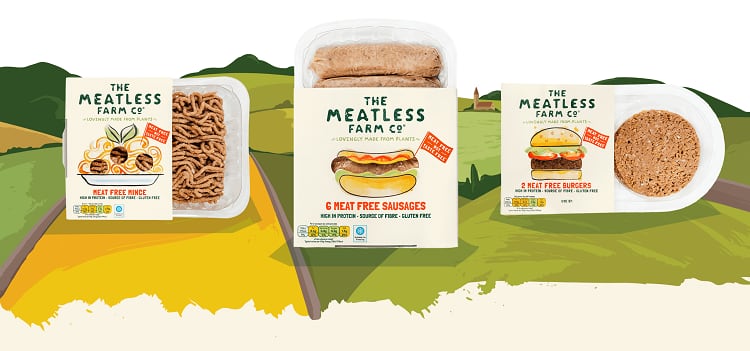The Meatless Farm has seen significant growth since its launch in 2016 and the UK company now has a presence in several global markets, including the US, Ireland, Sweden, Hong Kong, Canada and the UAE.
While the company is only four years old, it has big plans to take a significant slice of the plant-based pie internationally – with worldwide sales of plant-based products expected to top €25bn by 2025.
For the market to reach its full growth potential, plant-based manufacturers need to focus their innovation efforts today on delivering products that will bring new consumers into the category, Dr Peter Hynes believes.
The research and development expert stressed that innovation is central to achieving this. “For me, even within five- or ten-years time, it’s still about that behavioural change – getting people to switch easily. You are going to see products out there that you will really struggle to differentiate [from meat]. Products that have a flavour, texture, appearance that is [closer and closer to meat]. That gap between meat and plant-based is going to close – and it is getting closer all the time. In five- or ten-years’ time, I think it will have closed completely.”
While the current focus is on developing products that provide as ‘meaty’ an experience as possible, in the longer-term Dr Hynes tells us that NPD could push the envelope further still.
“There are more things we can do with it, more levers we can pull in R&D. Who knows, maybe the gap will go the other way. People will be thinking ‘why would I eat meat when there is a better product out there?’ It is scary, the possibilities that could happen.”
Rethinking centre-plate options

If the current drive in plant-based innovation helps people make the centre-plate switch to meat analogues, Dr Hynes believes that innovation could ultimately help deliver a more transformational change to our food culture.
“Who’s to say that people in the future won’t rethink the plate, rethink food nutrition, rethink how they are eating. That suddenly becomes a much wider space that we can work in that meat can’t. We have the technology and R&D that can cater to that space – who knows what my kids will be eating when they are my age. It’s really exciting. At the moment the category can change, it is changing all the time.
“A cultural shift needs to happen and is happening now.”
‘This is fresh, cutting-edge stuff’
Dr Hynes joined The Meatless Farm at the end of last year. A seasoned R&D professional, he has 11 years’ experience in innovation, including six years at industry giant Unilever, where he was a lead in a range of functions including consumer insights and NPD.
The decision to move to The Meatless Farm was driven by personal conviction that plant-based products need to form a greater portion of our diets for health and environmental reasons. “Learning more about my own food nutrition and my own rising awareness of the fact that we need to reduce our meat intake – it resonated strongly with me and my family,” he recalled. “It’s a very exciting category and it’s a very exciting company to work for.”
This is obviously a perspective that also resonates with a good many consumers, who are looking to meat analogues to help them reduce their meat intake. According to research from Mintel, UK sales of meat-free foods have grown 40% to an estimated £816m in 2019.
“The great thing with this category is you have consumers that are really becoming more and more switched on and they are looking at what is available,” Dr Hynes observed.
And while there is a massive amount of innovation going on in plant-based – Mintel shows almost one-quarter of new products launched last year were labelled as vegan – Dr Hynes thinks there is a lot more room for on-point NPD.
“There is a whole industry that is starting out and there is so much scope in the R&D-innovation space. We are not talking about an industry that is well established, that has a lot of R&D that has already been done. This is fresh stuff, cutting edge stuff. We are trying to push the boundaries of what is possible.”
The nutrition challenge: Meat analogies, fat and salt
As the sector works at ‘closing the gap’ between the experience of eating meat and plant-based products, Dr Hynes stressed that this should only be done in a way that also delivers holistic nutrition to consumers.
The nutritional profile of plant-based products is ‘one of the challenges’ the sector currently has to grapple with, he conceded.
“The reason I got into this industry - and the reason why The Meatless Farm was set up - was to provide that alternative to meat that is not sacrificing nutrition. I could make the greatest tasting plant-based burger, but it would be so high in fat and salt you’d be better off eating a real beef burger.
“That’s not the point of this. The point of this is to help human health and planetary health. Is it a challenge to try and make a product that is really tasty and really succulent but has a green or amber salt and fat level? Yeah, that’s a challenge.”
He suggested that both industry and consumers should ‘always be questioning’ the nutritional value of plant-based products. “Don’t just rely on the fact that it’s not a meat product to know its healthy,” he advised.

“If there is a beef burger out there and a plant-based alternative and the nutritionals tell you the beef burger is healthier, I know which option I would go for. So why would a consumer go for a plant-based product?
“Our nutritionals need to be on par with animal-proteins, if not better. I don’t really see an excuse to just stick loads of salt and fat in it and expect it to be a good product.”
Dr Hynes also believes that the plant-based sector needs to be more open about its nutritional credentials by adopting front-of-pack labelling schemes, such as traffic lights in the UK.
“Every company should be stepping up the game and being open. Having it on-pack in an accessible way for consumers so people know they are getting a fully rounded product,” he argued.
“If you have that holistic balance of the right nutrients and the right minerals in there – and the right flavours – that is certainly the way we should all go. Every consumer should be aware of what we are putting into our mouths. Plant-based products are no different.”
The core and more
While high innovation levels and increasing consumer interest are buoying the plant-based market – meaning retailers are allocating more space in store for meat alternatives - the competition for shelf space is also intense.
Here, Dr Hynes said innovation is key. “Innovation is always the one that can help to raise your profile and get the customer, the retailer, interested in buying your product. I know we need to stick close to the 'why' of our product. We need to make sure our staple products are good and of high quality. Then if we are fighting for space if we are the only ones – I’ll pick a product at random – that can produce plant-based ‘chicken’ nuggets, or hotdogs, they maybe then will be able to give us more shelf-space. That is clearly a good way in.”
Nevertheless, balancing ‘new’ product innovation with product renovation – improving the quality of The Meatless Farm’s core lines – remains an important priority for Dr Hynes.

“You have to get the basics – your core products – right. If they aren’t right then you may lose some equity, however good your next innovation might be,” he stressed.
His near-term focus is therefore about ‘strengthening the core’ while also ‘beginning to spread our wings’.
“The immediate thing is improvements we are looking at for our current products. That is our current focus. Then we have new opportunities coming in. It is finding a balance of resource.
“Am I satisfied with where we are in terms of our current products? No, we will do better.”
‘We are always looking for the next protein’
This drive to ‘do better’ sees the company examining new ingredients that can help it tweak the ‘flavour, texture and appearance of our products’. Part of this is about staying up-to-date with the ingredients and technologies that are ‘transforming all the time’ in this fast-paced space, the innovation chief explained.
“There are lots of things out there that we need to try. The technology is transforming all the time. It is important to work with our suppliers to get that. Are there new protein sources out there that can give us a better amino acid profile or a better bite? At the minute we use a mix of a few different proteins. Could we move to one or two, or are there more proteins we need to add? We are always looking for the next protein.”
Dr Hynes also sees opportunities for new ingredients to support efforts to improve the health profile of products through reformulation. “The salt levels, for example, there are ingredients out there like kelp or seaweed that can give a salty profile without the sodium content. Are they increasing in the scope of the work we are doing? Yeah.”
The Meatless Farm does not want to be a ‘version two’ of something like the Impossible Burger and Dr Hynes is not convinced the ‘blood angle’ is the way to go for the firm. “Is that a consumer driver, really? Is having a burger that bleeds something that we want, that consumers want?”

Colouring is one area that the company is particularly interested in new technological developments that can deliver improvements, he continued. “I am certainly looking at the new tech that is coming through for a colour, or the appearance of a burger. Does it look like a real meat burger when it's raw’? Is it looking like a real burger when it's cooked? Is that the right gap to close? Is there technology out there that can help make that transition?”
Likewise, texture is an important focus: “Is there tech that could give us a better bite, or chewiness? There is new technology coming out all the time… If there is a new protein that we need to be aware of we can’t be reactive to it. We have to be proactive. It is good old fashioned R&D, it’s research, looking at what is out there and testing it.”
The importance of strategic partnerships
For Dr Hynes, the best way to achieve this is to build strategic partnerships with ‘certain suppliers’ that ‘you think are going to be fruitful’.
He believes this is a more efficient and effective practice than relying on a patchwork of suppliers that can yield hit-and-miss results. “You could spread your net very wide and get loads of suppliers who are desperate to throw their technologies and raw materials at you. But that gets very busy and complicated.
“If you can start building strategic partnerships with certain suppliers, you can start working together. It is a lot more of a collaborative effort. If you can latch onto that right partnership that has a tech you can work with, that is certainly where I would be wanting to go for this company and the R&D team.”

